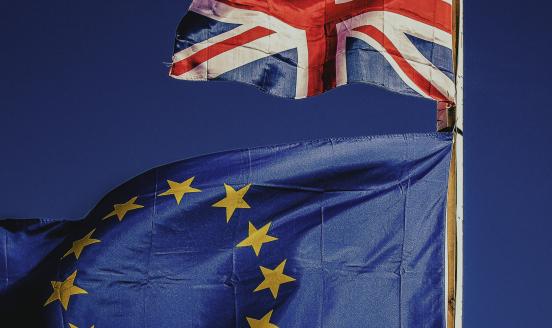The impact of Brexit on Northern Ireland: a first look
Following the proposal from the Scottish Government that Scotland remain in the Single Market, the differing “Brexpectations” of the UK’s four constit
Northern Ireland is different from the rest of the UK. It also faces distinct challenges from Brexit. The currently-open land border and a very close trading relationship with the Republic of Ireland make questions about border and customs controls especially relevant. The Irish-Irish border is certain to become a key topic of the debate.
Indeed, the House of Lords EU committee recently published a report on UK-Irish relations after Brexit, addressing many of the complex and interconnected issues that will arise in the withdrawal negotiations. In this blog post, we describe the channels through which Brexit may affect the Northern Irish economy, with a particular focus on the current state of cross-border economic integration on the island of Ireland.
Prospects for the future EU-UK trade relationship are still fuzzy (as explained here by André Sapir), but Northern Ireland is in an especially vulnerable position. Compared to other parts of the UK, Northern Irish trade relations show a distinct composition – with a high dependency on the Republic of Ireland. Add to that the significant flow of people who commute across the border on a daily basis, along with the link between economic integration and political stability, and the border issue becomes a major headache for Northern Ireland.
When it rains, it pours: a further blow to a fragile economy
Despite downgrades in growth predictions, reports suggest that Northern Ireland might approach Brexit “from a reasonably good place”. When compared to the rest of the UK, however, Northern Ireland still lags behind. Within the UK, the region has the highest unemployment rate, 1 percentage point above the whole-UK figure, at 5.8% (2013 third quarter, Labour Force Survey).
Northern Ireland was the region the hardest hit by the recession and recovery has been slow. On average, each person had a gross disposable income of £14 645 in 2014, lower than the national average of £17 965. GDP growth over the last two years was 1.5%, compared to overall UK growth of 1.9%. Additionally, 22% of the population was in relative income poverty in 2014, contrasting with 16.8% at UK-level. Lower productivity (86.8% of the UK average) and wages, together with a prevalence of small firms, complete the picture of an economy with structural fragilities. This all points to a region with weak economic resilience compared to the rest of the UK (Source: ONS and NISRA).
Highly dependent on EU markets, but mainly on Ireland
Northern Ireland’s openness to trade is not dissimilar to the rest of the UK. An indicator of trade openness, namely the ratio of a region’s total trade (in this case in goods) in relation to its own Gross Domestic Product, shows that Northern Ireland is fairly average, below England and Wales but above Scotland. The absolute numbers are not hugely different, (between 30-35% of GDP in 2014), although they are noticeably smaller for Scotland.
In light of this, the importance of international trade for the Northern Irish economy should not be underestimated.
But while Northern Ireland’s degree of trade openness is similar to that of the rest of the UK, its dependence on specific trade partners is different, in particular regarding the Republic of Ireland. Figure 2 shows Northern Ireland’s trade exposures (separately for exports and imports) with various groups of trade partners, compared to the rest of the UK.
We observe the following:
- As has been shown before, the UK as a whole relies on the EU for trade as much as it relies on the rest of the world.
- However, out of the constituent countries, this pattern is only true for England and Wales. Northern Ireland trades mostly with the EU, and in particular with the Republic of Ireland. Two thirds of exports from the EU and about half of imports to the EU are traded with the Republic of Ireland. The economic integration with the Republic of Ireland has risen substantially since the Good Friday Agreement. Since then, there has been a significant increase in cross-border trade, which was mainly driven by the increase in exports from Northern Ireland to the Republic. This improved the Northern Irish trade balance. Ultimately, political stability and cross-border cooperation paid a significant economic “dividend”.
In light of this higher reliance on the Irish market, according to the ESRI Northern Ireland is more exposed to the impact of any trade barriers that might emerge as a consequence of Brexit.
Border issues and cross-border commuters
Beyond trade, the imposition of either soft or hard border controls will also affect flows of people and labour. After the UK formally leaves the EU, the border between Northern Ireland and the Republic of Ireland will become the only external land-border of the United Kingdom with an EU Member State. Arrangements for border crossings are still uncertain, but any restrictions on the currently-open border could have a major impact.
Eurostat estimates that there are 7600 cross-border commuters from Northern Ireland and 12 100 from the Republic of Ireland (in 2015). In relation to total employment these amount to 1% and 0.6% respectively. While Irish figures are below the EU28 average, the share of commuters from Northern Ireland is comparable to continental Europe, as shown in Figure 3 below. This is noteworthy, because figures for the UK as a whole show very low levels of cross-border commuting.
In fact, the Centre for Cross-Border Studies presents even higher estimates. According to their research, in 2010 between 23 000 to 33 000 people were cross-border workers living and working on different sides of the Irish land border. This figure has been cited by several reports on the economic consequences of Brexit for Northern Ireland.
This integration of labour markets is largely possible thanks to the Common Travel Area (CTA) between the UK and the Republic of Ireland. Brexit will redefine the CTA as an agreement between an EU Member State and an external country. While Ireland’s non-participation in Schengen suggests that it should be possible for the CTA to continue after the withdrawal from the EU, the maintenance of the arrangements will require the agreement of all other Member States. Even if unchanged, the CTA only guarantees free mobility for Irish and UK citizens, not foreign cross-border workers.
Additional issues that add to the complexity of outcomes refer to the withdrawal of benefits such as the EU Social Security Coordination, which may be another disincentive for cross-border communiting. Also, by establishing the right to have Irish citizenship for everyone born in Northern Ireland, the Good Friday Agreement puts Northern Ireland in a unique situation because it entitles any Northern Irish citizen to become an EU-citizen. The uncertainty that surrounds all these future arrangements raises important questions with regards to the trade and labour relationships that Northern Ireland will be able to sustain.
Cross-border interactions will also be influenced by exchange rates. While a sterling devaluation will be beneficial to price competitiveness for Northern Ireland, it will also translate into higher price of imported inputs. This erosion in real disposable income might encourage migrant EU-workers to move from Northern Ireland to the Republic.
EU funding
Last but not least, as a net recipient for EU structural funds, Brexit will imply a loss of access for Northern Ireland to very beneficial development funding. In a previous blog post, Pia Hüttl and Jaume Martin Romero noted that the country “receives the second largest amount of EU funding in terms of percentage of regional GDP”. Access to Common Agriculture Policy funding in particular is crucial for the agri-food sector, which represents 5.5% of total employment and 3.2% of regional Gross Value Added. The high dependence of farms on direct payments has been documented by the Department of Agriculture and Rural Development.
But this is not only about economics…
The numbers above point to a Northern Irish economy whose trade relations deviate from those of the rest of the UK. Coupled with the fact that this is also the only UK region with a land border with another EU country, and different labour flow patterns this enables, Northern Ireland may stand more to lose from a bad arrangement with the EU. As Northern Ireland represents a small region in the UK (less than 3 per cent in population terms), it may struggle to exert pressure and wield influence in the upcoming negotiations.
However, given the very fragile political history of the region, it is only natural that political considerations should weigh in the discussion. As the Financial Times' James Blitz summarised from the recent House of Lords report: “the Northern Ireland question must not be relegated to a mean bargaining chip in the tough negotiations that lie ahead between Britain and the EU".



